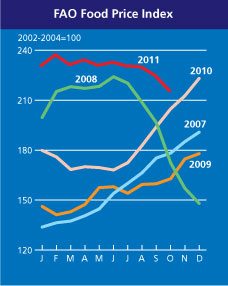From the Food and Agriculture Organization (FAO) of the United Nations comes much-needed good news on the food prices front:
The food price index averaged 216 points in October 2011, down 4 percent, or as much as 9 points, from September and 22 points, or 9 percent, below its peak of 238 points reached in February 2011. The index has been falling steadily since June and, in October, dropped to an 11-month low, but still some 5 percent above the corresponding period last year. The decline reflects sharp decreases in international prices of all the commodities included in the index.
Indeed, the food price index encompasses five food categories: cereals, oils and fats, meat, dairy, and sugar. The real good news is that the price of cereals — which constitute the bulk of the diet of the poor in developing countries — has also declined significantly:
The cereal price index averaged 232 points in October, down 5 percent, or 13 points, from September, 15 percent below its peak in April 2008, though 5 percent, or 12 points, higher than in October 2010. The continuing decline in the monthly value of the cereal price index reflects this year’s prospect for a strong production recovery and slow economic growth in many developed countries weighing on overall demand, particularly from the feed and biofuels sectors.
We should also expect a decline in social unrest throughout the world as a consequences of lower food prices (link opens a .pdf document).
